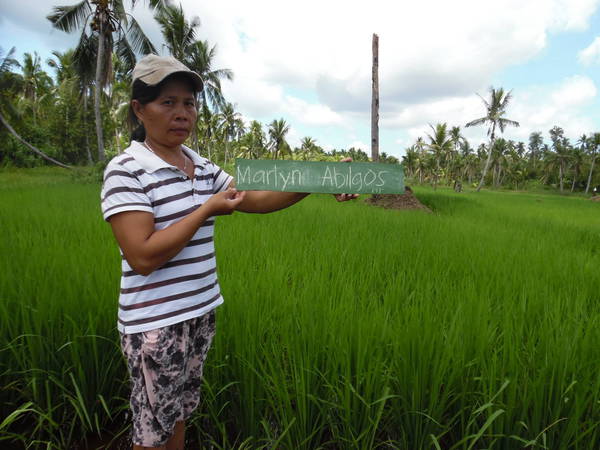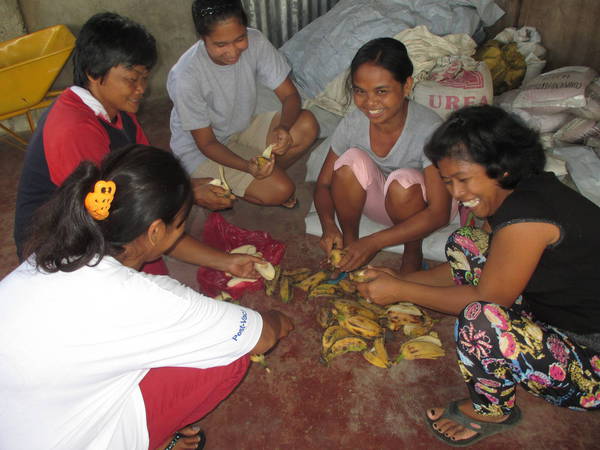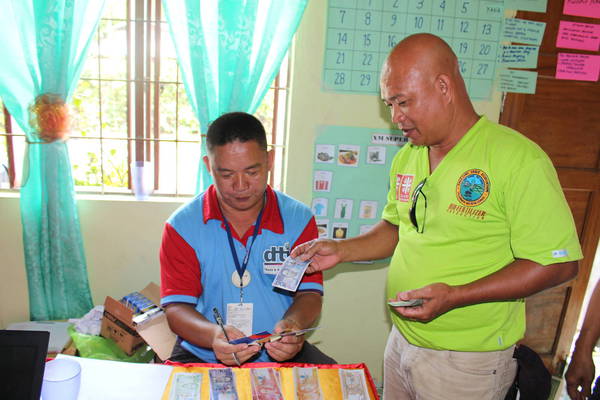A year ago, typhoon Haiyan, locally called Yolanda, hit a large part of the Philippines. It caused extensive damage to property, drove thousands of people from their homes and also killed many. Caritas Czech Republic as well as other national Caritas responded immediately. Through local Caritas organizations delivered food, water, shelter. Help the Philippines continued throughout the year and other activities will continue in 2015.
Which Seed Grows Better?
 In Basey, Samar, CCR’s local partner DSAC of Calbayog is working with rice farmers. Together with four Rice Farmer Associations, the DSAC started an “Organic Seed Adaptation Farm (OSAF). The OSAF helps farmers identify which rice seed is most adaptable to their local area. This is needed, as – due to the unpredictability of the weather – farmers like to understand which seeds fare best in different environments.
In Basey, Samar, CCR’s local partner DSAC of Calbayog is working with rice farmers. Together with four Rice Farmer Associations, the DSAC started an “Organic Seed Adaptation Farm (OSAF). The OSAF helps farmers identify which rice seed is most adaptable to their local area. This is needed, as – due to the unpredictability of the weather – farmers like to understand which seeds fare best in different environments.
The farmers have jointly planted more than thirty different rice seeds. The seeds include upland varieties – used for droughts – and flood-resistant varieties – used for saline areas. Each week they come together to measure the size of the plants and the number of tillers. Afterwards, they discuss the changes with the last week. At the end of the training –planned for beginning November 2014 – the farmers will decide which seeds they intend to promote in their area. With these seeds they potentially start a small seed bank.
During the training, the farmers also learn about how to manage different pests and diseases and make their own fertilizers/pesticides. Starting November, they will conduct a new trial where they will learn how to save on seeds, water and inputs while producing higher yields!
The above activities are part of a project the DSAC is implementing with CCR. The project is supported by the Czech Development Agency and Caritas Romania. Next to training, the farmers receive inputs (rice seeds, tractors, threshers). The project also focuses on Disaster Risk Reduction measures through village mapping and promotion of climate-resilient technologies. The project is being implemented in light of Typhoon Haiyan that hit the Philippines on 8 November 2013. The Typhoon left a trail of disaster and caused great distress on communities, including farmers. Many assets and crops were destroyed. Through support of the DSAC and Project CROPS, CCR hopes to contribute to the recovery and resiliency of these affected communities.
Why buy if you can make it yourself?
 In Marabut, Samar, the DSAC of Calbayog is working with two women associations. The women received seeds and tools to start small home gardens next to their houses. The women are also working together on two communal gardens in villages Osmena and Panan-Awan. Through the activity, the women hope to increase their access to food and sell surplus on the local market.
In Marabut, Samar, the DSAC of Calbayog is working with two women associations. The women received seeds and tools to start small home gardens next to their houses. The women are also working together on two communal gardens in villages Osmena and Panan-Awan. Through the activity, the women hope to increase their access to food and sell surplus on the local market.
The DSAC is providing the women with weekly trainings on organic farming. Through the training they hope to learn how to produce healthier food. One of the lessons learned is how to produce their own agricultural inputs. On Monday morning, they gather in the nearby village hall to get hands-on training from the DSAC’s Agriculture Technician. By using agricultural waste – such as rice and leaves - they are able to make cheap fertilizers.
The above activities are part of a project the DSAC is implementing with CCR. The project is supported by the Czech Development Agency and Caritas Romania. It is almost a year after Typhoon Haiyan hit the municipality of Marabut. The DSAC is supporting the women in Marabut to cooperate as a group and supplement their livelihoods.
"Alone we can do so little; together we can do so much”
 In the province of Eastern Samar, CCR is cooperating with Caritas Germany to support the farmers association “Amazing Grace Association”.
In the province of Eastern Samar, CCR is cooperating with Caritas Germany to support the farmers association “Amazing Grace Association”.
The Amazing Grace Association was formed in May 2014 in municipality Balangiga. The association is made up of a diverse set of people. Some are fishermen; some focus on carpentry and some others are retired professionals. They all have one thing in common: farming. Farming – however - has become increasingly difficult in Balangiga. Prices for inputs are high; crops are affected by changing weather conditions and markets are hard to access.
Typhoon Haiyan added to these challenges. People lost farming assets; saw their houses destroyed and fields scattered with debris. While clearly affected by the Typhoon, the leadership of the Amazing Grace Association came together to draw up a plan. “We can use the Typhoon as an opportunity to change the position of farmers.” A few months after Haiyan, they submitted a proposal to Caritas. They wanted to produce bio-fertilizer.
According to the association members, producing bio-fertilizer serves three goals:
- The sales of the fertilizer adds to the income of Haiyan affected people
- The use of organic fertilizers contributes to healthier food
- The use of organic fertilizer contributes to a more sustainable environment (e.g. by re-using agriculture waste; refrain from using chemicals, etc.)
Caritas will therefore help the Association to start-up a small bio-fertilizer production site. The production site includes an agricultural demonstration plot, a production center and a training hall. In an effort to promote organic farming to other farmers in Balangiga, the Amazing Grace Association will organize trainings on organic farming and teach others how to produce fertilizers.
The project has started in October 2014 and is supported by both Caritas Czech Republic and Caritas Germany.







